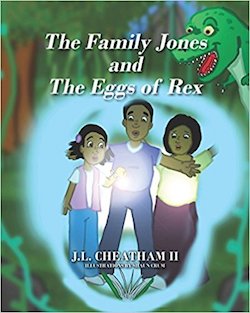"All the covers of the children's books, there were no black or brown faces." A conversation with J.L. Cheatham II

On August 26th at Washington Hall, author J.L. Cheatham II will host his second Seattle Urban Book Expo — a big party to promote Seattle's many authors of color. I sat down with Cheatham last week to talk about how he became a writer and what inspired him to start the Seattle Urban Book Expo. We've divided this interview into two halves: this first part covers how Cheatham came to be an author, and the second half deals directly with the Book Expo.
So to start, you could talk a little bit about how you became an author?
It literally started when I was about five years old and I watched professional wrestling for the first time. Ric Flair was fighting a guy who was being cheered by people and then I realized, "Hey, he's a bad guy, and the other guy's a good guy." And then my dad used to get me comic books: Spider-Man, Batman, and Archies. I was heavy into Archie. I’d read them at dinner — a fork in one hand and the other hand turning pages. It grew from there. I wanted to be a storyteller. The fact that we're able to create a world that's fictional and get anyone to believe it — that's a powerful ability.
Yeah.
In elementary school, I would create comic book stories for homework assignments. As I got older, I was pushed more towards sports. I didn’t find anything that would cultivate my passion for writing. There was a lot of sports in my neighborhood so I would play football, baseball, things like that. When I got to college, I was hurt so badly that I couldn't go to bed. I couldn't sleep because my ribs were throbbing.
Then when I was watching TV, my favorite movie came on: The Lion King. And then I felt that little joy again, the way I did when I was a kid when I'd write stories. Following that, it was some B-rated movie with that guy, Lorenzo Lamas? He was, like, the leader of a vampire-stripper cult.
I literally was talking to my girlfriend at the time like, "I could write this. If this made it to TV, I could do this.” So as soon as I made that decision, I began losing interest in playing sports. I didn't want to play football that much anymore.
Okay.
Then, I found out I was going to be a father and I decided that when my daughter sees me, she knows that her dad is pursuing his dream of being a writer. At first, I wanted to write movie scripts because after that whole Lorenzo Lamas movie, I thought I could do better. I wrote a couple of movie scripts, but I was having no luck whatsoever.
When my daughter turned four years old, she was into dinosaurs. She wanted a dinosaur book, so I was like, ‘Okay, cool. We'll go to the Barnes and Noble in Tukwila and look for a dinosaur book.’
When I got there and went to the kids section, I was looking around and something grabbed me: All the covers of the children's books, there were no black or brown faces. I looked at my daughter and I was like, "I'll write her a dinosaur book." And that's what my first book came from, The Family Jones and the Eggs of Rex. I literally had to learn how to write a book. I had to research story structure, manuscripts, self-publishing versus publishing.
I was scared to death. I didn't know what kind of world I was getting into. Copy-editors, proof-reading, theory. It took me a while, like five months, and then I wrote the manuscript, found a self-publishing company and found an illustrator.
I didn't know what was going to come. I didn't realize that I actually had to do some work. I thought you just published a book and it just magically flowed into people's homes, or stuff like that.
I was a bit discouraged because sales weren't going the way I wanted to, and I wasn't getting the attention I felt like I deserved. But then I asked myself, "Am I giving this a hundred percent?" Meaning, am I doing everything I can to promote my work? and I answered no. Then I asked myself, "Okay so how can you give this a hundred percent?" And I was like, "I have to go out and travel."
Literally a week later after I made that decision, I was approached by Stacey Robinson, who runs a book expo, in Toronto. And she invited me to come out there to market my book. Not only had I never been a part of an expo, I'd never been to Canada.
What was that like?
When I went out there, man, it blew my mind. Just the energy, the crowd, the music — everything. Literally when I got off the plane back to Seattle, all the energy just washed off me. My shoulders slumped and I was like, "aw man, what happened to all the festival feelings?”
I was like, "I need something like that for my city." Then when I started researching more, if there was a book expo, I couldn't find one. It was baffling to me that there'd never been an expo for black and brown writers. There's a lot of African-American culture in the city, so I was kind of shocked there had never been an actual book expo here.
So then I decided to do something like that.